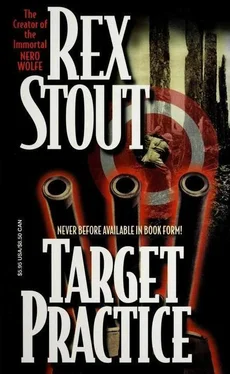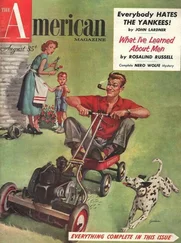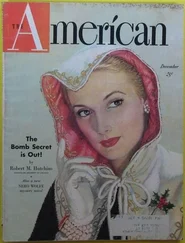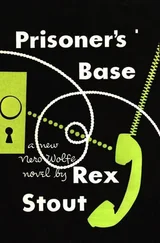Rex Stout - Target Practice
Здесь есть возможность читать онлайн «Rex Stout - Target Practice» весь текст электронной книги совершенно бесплатно (целиком полную версию без сокращений). В некоторых случаях можно слушать аудио, скачать через торрент в формате fb2 и присутствует краткое содержание. Город: New York, Год выпуска: 1997, ISBN: 1997, Издательство: Carroll & Graf, Жанр: short_story, Детектив, на английском языке. Описание произведения, (предисловие) а так же отзывы посетителей доступны на портале библиотеки ЛибКат.
- Название:Target Practice
- Автор:
- Издательство:Carroll & Graf
- Жанр:
- Год:1997
- Город:New York
- ISBN:978-0-7867-0496-5
- Рейтинг книги:5 / 5. Голосов: 1
-
Избранное:Добавить в избранное
- Отзывы:
-
Ваша оценка:
- 100
- 1
- 2
- 3
- 4
- 5
Target Practice: краткое содержание, описание и аннотация
Предлагаем к чтению аннотацию, описание, краткое содержание или предисловие (зависит от того, что написал сам автор книги «Target Practice»). Если вы не нашли необходимую информацию о книге — напишите в комментариях, мы постараемся отыскать её.
All-Story Magazine,
Target Practice — читать онлайн бесплатно полную книгу (весь текст) целиком
Ниже представлен текст книги, разбитый по страницам. Система сохранения места последней прочитанной страницы, позволяет с удобством читать онлайн бесплатно книгу «Target Practice», без необходимости каждый раз заново искать на чём Вы остановились. Поставьте закладку, и сможете в любой момент перейти на страницу, на которой закончили чтение.
Интервал:
Закладка:
At length we talked, but aimlessly. As a lawyer I had held the belief that no man should pay blackmail under any circumstances, but I faltered before the simple, hard facts. Refuse to pay, and Janet’s life would be ruined; pay, and it would probably be the same in the end anyway. Blackmailers, like cats, always come back. I said these things and many others to old Hawkins, and he merely sat and nodded his head miserably.
“What can I do,” he mumbled hopelessly. “I’ve got to pay. I could kill him, I suppose, but that would be just as bad for her. They’d find out who I was and it’d be the same thing. It’s only Nosey Gruber would do this. There’s never been any search for Janet — why was it Nosey saw that picture?”
I tried to get him to tell me what the offense was for which Janet had been committed, but he wouldn’t talk about it; he would only say that she was innocent and that it was all his own fault. He began again on the subject of the mortgage. He was half-crazed by fear; the thing must be done that day, at once, or Gruber would wire New York. Of course that was absurd, but the old man was unable to think clearly. In the end I refused pointblank to do anything unless he would consent that I first go to Dal Willett for advice. This was a sudden impulse, and nothing but a move of weakness on my part; the responsibility was more than I was willing to assume alone; but, on the other hand, I had come to believe greatly in Dal’s shrewdness and he might, after all, suggest something. To that I succeeded in getting Hawkins to agree, and leaving him there in the office I departed.
I’ve never seen Dal Willett worked up except that morning. The way I blurted the thing out in a breath had something to do with it, I suppose, but I have an idea that it was more the feeling he had for Janet. It opened my eyes to what passions and aches there had been behind his always quiet manner; I guess after all there was one human being he loved even more than he did his horses. I was astounded at the way he blazed up into fury; and then suddenly he was quiet again.
“Of course,” he observed, “it isn’t open to discussion. John can’t refuse to pay. It would mean Janet’s ruin and his own death, for the thing would certainly kill him. And he can’t pay either. Gruber would come back again and again, and when the old man dies he’ll keep after Janet. That would be just as pleasant as hell.”
I mumbled something about there being nothing else to do but pay. Dal glared at me.
“I said it wasn’t open to discussion, didn’t I?” he returned testily. “It’s a case of only two alternatives and both of them impossible.”
That appeared to me somewhat absurd. It must be either yes or no. Dal walked to the window of his little office and stood there with his back to me for a long while. I was conscious mostly of a great relief at having gotten half the burden off my shoulders, and I merely sat in silence and waited. Outside in the stable I could hear the boys calling to each other as they hauled the rigs up to the runway for cleaning, and the stamping of the horses’ feet in their stalls. Mot, Dal’s black and white coach dog, wandered in through the door and came up to stick his nose in the palm of my hand, and then ambled out again. Ten minutes passed without anything being said.
Suddenly Dal turned from the window, and I saw immediately from the look on his face that there was something in his mind.
“John’s over in your office?” he asked abruptly.
I nodded. “I left him there.”
“All right. Go and tell him to go back to the farm and stay there. Tell him to leave this thing to me. If Gruber telephones he must refuse to talk to him. If he’ll do that everything will be all right. Tell him I said so.”
“But what—” I began, bewildered.
“Do what I tell you. And tell the old man not to worry.”
That was all he would say, and a minute later I was trotting back to my office to carry out his instructions.
I anticipated a hard job of it, but old Hawkins was surprisingly amenable, and the secret of it was the unlimited confidence he felt in Dal Willett. As soon as I told him that Dal had given his word that “everything would come out all right” the old man meekly agreed to do just as he had said. He wanted to go around to the livery stable to talk with Dal, but finally I persuaded him to carry out the instructions to the letter. I went out to the street and unhitched his horse for him and watched him head south and disappear in the direction of the farm.
I hadn’t any idea what Dal was up to, and I’m not sure even now that he had figured it all out that morning in his office, though I think it likely. It was easy even for me to see that there was only one way out; and having decided to do the thing it remained merely to find the means. It was characteristic of Dal that he let it happen as naturally as possible.
I stopped at the livery stable on my way home that evening. Dal was seated out in front as usual with a cigar in his mouth. I had telephoned him at noon that Hawkins had agreed to obey instructions, and now as I halted in front of him I had fifty questions on the tip of my tongue. I asked if he had seen Gruber.
“No, and I’d rather not talk about him,” he replied; and since I saw that none of my questions would be answered I went on home without asking them.
The following morning I, myself, saw Gruber as I walked down Main Street to my office. He was seated on the piazza of Charley Smith’s Commercial Hotel, reading a magazine and smoking a cigarette. I looked at him curiously, and in the light of what I knew the man appeared more repulsive and snaky than before. He looked up and stared at me, and I hastened my step to get past the place.
A little before noon I had a telephone call from John Hawkins. At the first sound of his voice I could tell that the security he had felt from Dal Willett’s assurances had become considerably weaker; the old man was almost in a state of panic again. Gruber had called up the farm twice that morning; Janet had answered the phone and told him her father would not speak to him. Janet was beginning to suspect some kind of trouble — luckily she had not seen Gruber — and Hawkins had evaded her questions with difficulty. I tried to reassure him, and he finally agreed to hold fast.
All that day I seemed to myself to be hanging in the air. A dozen times the impulse seized me to go to Dal’s and find out if anything had happened. It was Thursday, the day on which Gruber had said the money must be paid; and though I knew that was merely a bluff I somehow felt that before the sun went down that night the thing would be settled. By the middle of the afternoon I was quivering with expectation so I could hardly stay in my chair. I pictured Dal walking calmly down the street to where Gruber was perched on the Commercial Hotel piazza, drawing a revolver and filling him full of bullets; I could see Gruber topple over with his ugly face knocking against the rail. Dal would then go down and give himself up to Tom Connolly, and they would send for me. My mind went forward to the courtroom, to the trial, and I saw myself opening for the defense — it would be a tremendous speech—
I shook myself and got to my feet, and crossing to the window saw Gruber walking down the street on the other side. I started as though I had seen a ghost. He was going along at a good pace, like a man who intends to get somewhere. I watched him till he disappeared around the corner two blocks down. Then I went back and sat down again at my desk.
I had a picture of Janet there in a drawer, and I pulled it out and looked at it. Old Hawkins’s words protesting his daughter’s innocence were in my mind, and I smiled. They had been so perfectly superfluous. To think of a girl like that in the clutches of a Gruber! I began to indulge in memories, and was soon lost in a sentimental reverie.
Читать дальшеИнтервал:
Закладка:
Похожие книги на «Target Practice»
Представляем Вашему вниманию похожие книги на «Target Practice» списком для выбора. Мы отобрали схожую по названию и смыслу литературу в надежде предоставить читателям больше вариантов отыскать новые, интересные, ещё непрочитанные произведения.
Обсуждение, отзывы о книге «Target Practice» и просто собственные мнения читателей. Оставьте ваши комментарии, напишите, что Вы думаете о произведении, его смысле или главных героях. Укажите что конкретно понравилось, а что нет, и почему Вы так считаете.












